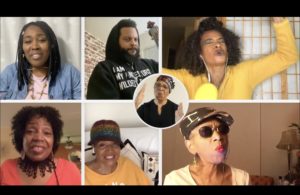“Music does everything for me,” says Aisha Kahlil. “It heals me. It uplifts me. It has brought me back from the brink of despair.”
Kahlil is a vocalist in the Grammy-nominated ensemble Sweet Honey in the Rock, whose sound encompasses elements of gospel, jazz, folk, hip hop, and rhythm and blues. Now in its 50th year, Sweet Honey in the Rock will take the stage at Provincetown Town Hall this Sunday, Dec. 18, at 3 p.m. as part of Payomet’s Road Show series.
The show is called “Celebrating the Holydays” and will feature “a rare fusion of traditional American holiday spiritual songs and hymns, as well as songs from other cultures and religions ranging from Africa to Israel,” according to the Payomet website.

Kahlil says the ensemble has changed quite a bit over the last half century. The group was founded in 1973 by Bernice Johnson Reagon, who was a member of the Student Nonviolent Coordinating Committee Freedom Singers in Albany, Ga. In its earliest days, Sweet Honey in the Rock was an a cappella quartet. (Reagon retired from the group in 2004.) The ensemble began integrating percussion several years ago and has recently expanded to include bass player Romeir Mendez.
Kahlil, who is based in Silver Spring, Md., has been performing with the group since 1981. She has also worked as a choreographer and dancer. “I love the deepening of myself inside of sound,” she says.
Several other longtime members will be performing Sunday in Provincetown, including Carol Maillard, who was one of the group’s four original vocalists, and Louise Robinson, another from the initial lineup who returned in 2004 after taking a break to perform on and off Broadway.
The ensemble has been nominated for three Grammy awards and was among those chosen to perform “This Land Is Your Land” at the centennial celebration of Woody Guthrie at the Kennedy Center in Washington, D.C. in 2013.

Listening to Sweet Honey in the Rock feels like being swept along with a swelling wave before it crests. Even when the music expresses injustice and terror, there is an overwhelming sense of beauty. The music is alive with a force both unnerving and life-giving, as haunting as it is swaddling.
#LoveInEvolution, the groups last album, was released in 2016. According to its website, the best songs “come literally ripped from the headlines of today’s world news, railing against systemic injustice as it pertains to people of color — past and present — police brutality, gun control and the Black Lives Matter movement.”
A standout track on the album, “Oh, Sankofa,” describes the Tulsa race massacre of 1921. Sankofa is a word used by the Ghanaian Akan tribe meaning “it is not taboo to fetch what is at risk of being left behind.” The lyrics express the need to remember what is painful: “We must remember, perhaps forgive but not forget, so we will not repeat the past; the things that we regret.”
The group’s voices, set to the rhythm of a twanging bass, are twistingly joyous even as they mourn and recount the violence: “Greenwood bombed from the air, Little Africa burned to the ground; the residents of Black Wall Street were murdered and gunned down.” The work is both melodic and melancholic, a cadence of horror and hope.
The collective maintains its commitment by adapting as injustice evolves. “Second Line Blues,” another track on #LoveInEvolution, begins with wordless humming in a wistful timbre before a voice enters the texture: “The place is Anytown, U.S.A. It’s just another sunny day.” Set against a sturdy snare drumbeat, the voice then begins to list the names of those lost to gun violence and hate crimes.
“Since we started writing this piece, we’ve had to keep adding names,” says Maillard in the press material for the group’s current tour. “And sadly, we’ll be adding more before things change.”
In May 2020, members of the collective recorded a version of Nina Simone’s “Come Ye (from a distance)” while in Covid-mandated isolation. The video, available on YouTube, was produced as part of This Moment, described as “a virtual rally and artistic uprising for an inclusive America.” The video includes an American Sign Language (ASL) interpreter, as does each of the ensemble’s live shows. (Barbara Hunt will provide live ASL interpretation at town hall on Dec. 18, and discounted tickets are available for those who identify as deaf or hard of hearing.)
For Kahlil, it’s music that shows “there’s still hope for life, a better life, for love.” Atrocity and beauty would seem to be impossible to capture at the same time, but somehow Sweet Honey in the Rock manages to reconfigure this separation to show how often they coexist. It’s a superterrestrial feat.
Kahlil sees it as a sacred one, too. “Music is the holy art for me,” she says.
Celebrating the Holydays
The event: Sweet Honey in the Rock in concert as part of Payomet’s Road Show series
The time: Sunday, Dec. 18, 3 p.m.
The place: Provincetown Town Hall, 260 Commercial St.
The cost: $30-$55 at payomet.org, with discounts for those who identify as deaf or hard of hearing
